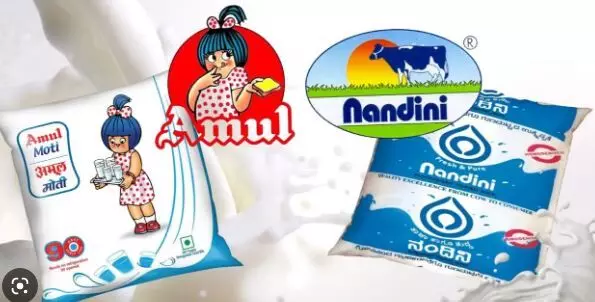
Milk boiling in the political stir in Karnataka
text_fieldsThe milk market conflict between two prominent dairy brands, Nandini of Karnataka and Amul from Gujarat, has sparked political controversy in Karnataka and some discussion at the national level. The Gujarat Cooperative Milk Marketing Federation, the producers of the Amul brand, is the largest dairy organization in the country and Nandini which ranks second in the country with a turnover of Rs 21,000 crore is a cooperative of milk producers Karnataka Milk Federation, under the State Cooperative Department of Karnataka. Nandini, as the leading brand in Karnataka, has become a household name synonymous with its familiar taste and an essential addition to any dinner table. The dispute has arisen in the lead-up to the May 10th elections in Karnataka. The news of Amul's milk and yoghurt being marketed in Karnataka and the feared move to merge the company with Amul is at the centre of controversy. Amul's butter, milk, cream and other beverages are already sold in Karnataka, but milk and yoghurt have only recently started selling there. Amul produces 1.8 crore litres of milk per day, followed by Nandini's at 90 lakh litres. Despite being more expensive by about Rs 10 per litre, there is a concern in Karnataka that the entry of this market giant may lead to the demise of the local brand, 'Nandini.'
Although Amul's management insists that their move has no such predatory intentions, there are underlying reasons for the concerns of Kannadigas. One of them is the statement made at Mandhya by Union Home Affairs and Cooperation Minister, Amit Shah, during his visit to Karnataka in December last year, where he suggested that Amul and Nandini would benefit from joining hands. Former Chief Minister and opposition leader of Janata Dal-S, H.D. Kumaraswamy, promptly came out criticizing the statement, viewing it as a plot to destabilize the state's dairy cooperative sector. The opposition claims that Amul's entry and the talks of a merger with Nandini are tantamount to Gujarat attacking Karnataka. Siddaramaiah, a leader of the Congress party, also entered the picture and highlighted that, Amul's sales increased while Nandini's decreased, leading to a reduction in milk production and availability of milk in KMF's cooperatives. Nandini is a popular product that is deeply integrated into the daily life of Karnataka. In response, the Bengaluru Hotel Owners' Association has pledged to use only Nandini and boycott Amul. Despite this, the BJP leaders governing the state and Chief Minister Basavaraj Bommai have denied any plans for a merger and promised to support Nandini. However, leaders from the Congress and JD(S) parties have expressed concerns over low milk production and collection in the state, warning that it may impact the lives of 28 lakh farmers and 2.5 lakh workers.
Secondly, there has been widespread opposition to the recent proposal to label yoghurt packets with the Hindi word 'dahi' as part of the central government's efforts to promote the use of Hindi. This proposal has been met with strong opposition in Karnataka, as also in Tamil Nadu, where there is resistance to the central government's attempts to impose Hindi on everything and as names in the state. Even though the proposal has been put on hold for the time being at the face of stiff opposition, there are concerns that if the country goes about adopting a single name for everything, Nandini may lose its distinct identity.
Political circles see this as an intrusion not only into the milk production sector but also into the cooperative sector. Although co-operation is a state subject, a new ministry for Cooperation was created in July 2021, with Amit Shah as its minister. This was also seen as having some specific goals. The Ministry of Agriculture, Cooperatives, and Farmers Welfare was split to form the new Co-operation Ministry. The ruling BJP party has a premise that local groups in the cooperative sector and institutions like rural banks play a key role in connecting with the people, as is seen with its significant impact in states like Kerala and Maharashtra. The increasing regulatory measures against cooperative banks in Kerala, though justifiable on technical grounds, are seen as a sign of the Centre's interference not only in the milk production sector but also in the cooperative sector. With the formation of a new Ministry of Cooperation, it is believed that the ruling BJP aims to strengthen the Centre's authority by gradually taking control of the cooperatives, which will further help the BJP's national orientation for strengthening the Centre at the expense of the States. But in the ongoing dairy war, given the sensitivity of the local interests and the conflict of interest involved, Karnataka BJP will be at pains to support this propensity for centralization.













